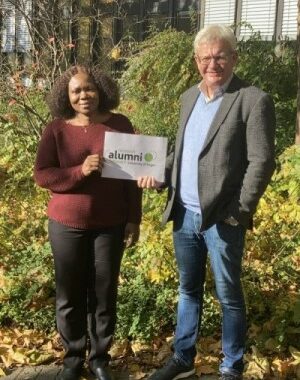The University of Siegen has and continues to build strong connections with partner universities across the world. These connections often begin with personal connections which arise from research projects. One of these close partnerships is that between the University of Siegen and University of Ghana, located in Accra, Legon, the capital city of Ghana.
This partnership began with the close research collaboration between Dr. Efua Esaaba Mantey Agyire-Tettey and her PhD supervisor, Prof. Dr. Johannes Schädler. Since completing her PhD at the University of Siegen, Efua, a Senior Lecturer at the University of Ghana, has maintained a close research partnership with Prof Schaedler and the Centre for Planning and Evaluation of Social Services. She has returned to Siegen University for several research visits to allow for research cooperation on numerous joint research projects. These projects are all focused on inclusion of people with disabilities in Western Africa, particularly Ghana
Her first research project together with Prof Schaedler and his department looked at social services in two contrasting regions of Ghana, Suhum which is a peri urban area, and Cape Coast Metropolitan Assembly, an urban area. This comparison was done to look at divisions in the provision of social care services, and differing approaches to its delivery, such as whether it is provided informally( by the family and wider community), or formally ( by the government).
This joint research has created a foundation for further research cooperation between both universities, with successes from smaller projects leading onto larger ones.
This wider cooperation began six years ago with smaller exchanges of social work students among each institution, with Efua helping to coordinate the exchanges on the Ghanaian side. In the past six month four Siegen students have been in for study visits in Ghana to do research for their Bachelor thesis. Further projects have received funding, including one on how to make use of ICT technology to improve communication for people with disabilities in remote areas (FACIL-ICT Ghana), which is supported by Engagement Global.
Prof Schaedler and Efua’s current largest joint project is on the Life Course And Transitions Of Persons With Disabilities In West African Societies (LICOT WASO). LICOT WASO is a three year project to build doctoral student capacity with the possibility for further extension. It is funded by the German Federal Ministry for Education and Research (BMBF), and managed by both the University of Ghana and the University of Siegen. The main objective of this project is to understand the developmental path of persons with disabilities throughout each stage of life, from childhood through adolescence into adulthood and old age.
The LICOT WASO project has provided scholarships to 8 PhD students from different departments at the University of Ghana, each of whom is undertaking their research from different approaches. Currently their research is focused on Ghana, but there are plans to try to expand it to other countries in the region, including Liberia.
In February 2022, the LICOT WASO teams from Germany and Ghana team met at the University of Ghana. At the meeting, the 8 PhD students presented their results of what they have done, had a thorough discussion on their presentation including methodological questions from the audience and their peers. Also planning for an international conference in July 2022 at the University of Siegen in July 2022 was discussed with emphasis on participation of the eight doctoral students and LICOT WASO steering group and other participants who may be interested from Ghana. It is believed that the conference will strengthened exchanges, cooperation and provide opportunities for new ideas to be shared, which could lead to new research collaborations in future.
Given the success of these projects, the University of Siegen and the University of Ghana are currently preparing a ‘Memorandum of Understanding’ to firm up existing collaborations which will form the basis for a wider cooperation and to build a ‘focused partnership’.
